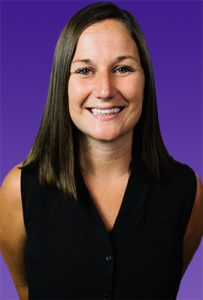Md. Alamgir Hossain, a graduate student in the  department of English, recently interviewed Sara Colombo who graduated from the University of Illinois at Urbana-Champaign in 2009. Sara majored in English and minored in Secondary Education. From an early age, Sara wanted to be an English teacher, and she got her first teaching job in 2009. After five years of teaching English in the Chicago Suburbs, she decided to change careers and utilize her skills in sales. She is now the Director of Business Development at Jellyvision, a technology company in Chicago. In the interview, Sara recounts her journey from being a student to being an executive and gives valuable advice to English undergraduate students.
department of English, recently interviewed Sara Colombo who graduated from the University of Illinois at Urbana-Champaign in 2009. Sara majored in English and minored in Secondary Education. From an early age, Sara wanted to be an English teacher, and she got her first teaching job in 2009. After five years of teaching English in the Chicago Suburbs, she decided to change careers and utilize her skills in sales. She is now the Director of Business Development at Jellyvision, a technology company in Chicago. In the interview, Sara recounts her journey from being a student to being an executive and gives valuable advice to English undergraduate students.
What is your current job?
Currently, I am the Director of Business Development at Jellyvision. Jellyvision is a technology company in Chicago with around 400 employees. I manage a team of about 20 Inside Sales Representatives that are responsible for reaching out to potential clients and getting them interested in our products.
What challenges did you face to get there? What do you like about it? Where do you hope to go from here?
My career actually started in education. My degree from U of I is in English, but I was in the college of education for Secondary Ed. So my first job was teaching high school English. I taught English in two different high schools. I learned after five years that teaching wasn’t the career for me.
I loved the students and teaching English, but I no longer loved the content I was required by the state to teach. There were also leadership changes every year in both districts, and I just wanted to do something different. So from there I knew I needed to start over at an entry level job.
I searched for a job for a few months. I probably applied to about 50 positions throughout Chicago. I finally got an entry level sales job at a media company called Guerrero Howe. My English degree came in handy here as we were required to have super strong communication skills for this role. This is where I learned to make phone calls and sell. After a year at Guerrero Howe, I got the job at Jellyvision. Again, it was an entry level position, and I was 27 years old.
I worked extremely hard, learned everything about the company and got promoted every year which got me to where I am now as the director.
I LOVE my job, the company, and the people I manage. I hope to stay here for a long time and really become an expert and outstanding manager.
How has your background in English helped you in your career?
I am SO thankful for my English degree. It has helped me so much throughout my career. Obviously in my first jobs as a teacher it was extremely helpful. But throughout my last two companies, it has helped me grow. During my job search I had to write tons of cover letters and introductory emails. I have to communicate with high level prospects via phone and email, and I have to communicate with my VP and CEO every day. My English degree allows me to be confident in my emails and communication skills as a whole.
What skills that you learned in your college classes do you find yourself using now?
Definitely organization and time-management. Even though those are “soft” skills, I learned how to perfect them at U of I, and I constantly lean on that today.
Writing with purpose and using a consistent tone is very important as well. I also do my best to be concise in my emails and writing, and proofread everything before sending.
From your experience, could you tell us what qualities employers seek in a candidate?
In every interview I have been in or conducted, employers appreciate a candidate who has done their research. Even if the candidate has a non-traditional background or work history, research is way more important. Coming to an interview or phone screen with your “homework” done is the best advice I can give. Come prepared with LOTS of questions about the company and the role. Come prepared with insight about how your background can relate to the job. Be diligent, thoughtful, and prepared, and it won’t matter what your degree is in. Be willing to work hard, and learn and grow, and you can start a career anywhere.
Would you give some suggestion to our undergrads regarding how to make the transition from college to working life?
I would suggest you apply to any and every job you can. Get your name and resume out there and practice, practice, practice with phone screens. No interview is a waste of time. You will get better each time, and you will find something you really enjoy. You must also be willing to start at the bottom. If you find a company you really like, you may not get the exact role you want, but you can get a foot in the door and start your career. Then you have to be willing to work the hardest and stand out from the crowd in order to move up. Do your best to stand out of the crowd on your resume and cover letter. Add style points that will allow the recruiters to remember you. Be yourself. Be genuine. Be kind, and be hungry.
What are some of your future professional goals?
My goals currently are to grow my team to one of the best business development teams in the city. We are getting really really good, but I want us to be great. I’d also love to use what I have learned about sales and teach again either in a college setting, or as a speaker at technology events. I have truly found a job I love in sales management, and I plan on staying as long as I can to become better and grow within a company that is doing really exciting things in the benefits communication space.
What advice do you have for students interested in exploring the field you are in now?
My advice is for students to do their research on SaaS (Software as a service) sales. It is a growing field with a ton of potential. Even if sales sounds scary, or they may not want to make phone calls, it is really an exciting space to start a career. Do research, see if you can set up job shadows, talk to friends and family who have had jobs in sales, and see if it is something that would be interesting to you! Within technology companies, there are also jobs in project management and implementation. This roles are great for English majors, as they also require organization and communication skills. The important thing is to find something you like and that you can do well, and run with it!





 Recently we had a chance to talk to Kelly McEathron, an English graduate from the University of Illinois at Urbana -Champaign, who works as a Management Trainee at Cintas. Kelly is currently in her 1st rotation out of 4 for Direct Sale and Strategic Market. With every day being different and exciting at work, Kelly likes to unwind by hanging out with friends and family, exploring the city, and walking the dogs. She said many great things about jobs, careers, and qualities expected from a candidate.
Recently we had a chance to talk to Kelly McEathron, an English graduate from the University of Illinois at Urbana -Champaign, who works as a Management Trainee at Cintas. Kelly is currently in her 1st rotation out of 4 for Direct Sale and Strategic Market. With every day being different and exciting at work, Kelly likes to unwind by hanging out with friends and family, exploring the city, and walking the dogs. She said many great things about jobs, careers, and qualities expected from a candidate. department of English, recently interviewed Sara Colombo who graduated from the University of Illinois at Urbana-Champaign in 2009. Sara majored in English and minored in Secondary Education. From an early age, Sara wanted to be an English teacher, and she got her first teaching job in 2009. After five years of teaching English in the Chicago Suburbs, she decided to change careers and utilize her skills in sales. She is now the Director of Business Development at Jellyvision, a technology company in Chicago. In the interview, Sara recounts her journey from being a student to being an executive and gives valuable advice to English undergraduate students.
department of English, recently interviewed Sara Colombo who graduated from the University of Illinois at Urbana-Champaign in 2009. Sara majored in English and minored in Secondary Education. From an early age, Sara wanted to be an English teacher, and she got her first teaching job in 2009. After five years of teaching English in the Chicago Suburbs, she decided to change careers and utilize her skills in sales. She is now the Director of Business Development at Jellyvision, a technology company in Chicago. In the interview, Sara recounts her journey from being a student to being an executive and gives valuable advice to English undergraduate students.